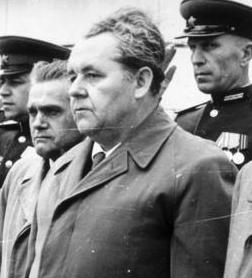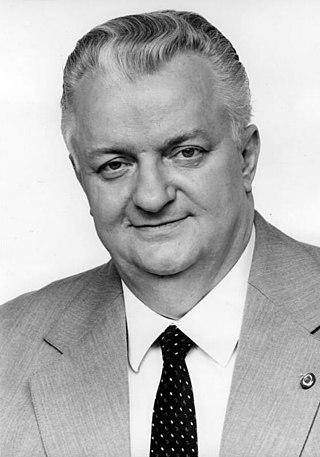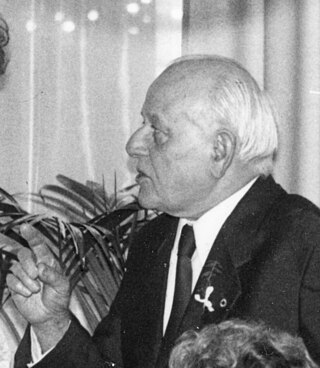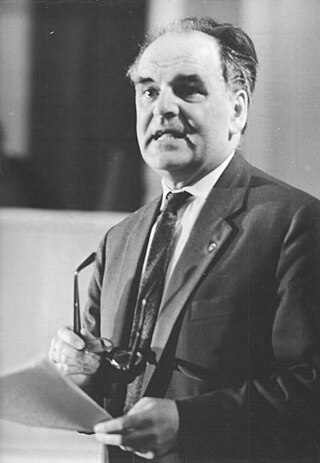Related Research Articles

Lignite, often referred to as brown coal, is a soft, brown, combustible sedimentary rock formed from naturally compressed peat. It has a carbon content around 25–35% and is considered the lowest rank of coal due to its relatively low heat content. When removed from the ground, it contains a very high amount of moisture, which partially explains its low carbon content. Lignite is mined all around the world and is used almost exclusively as a fuel for steam-electric power generation.
The Council of Ministers was the cabinet and executive branch of the German Democratic Republic from November 1950 until the country was reunified on 3 October 1990. Originally formed as a body of 18 members, by 1989 the council consisted of 44 members.

Paul Merker was an activist member of Germany's Communist Party who later became a politician and a top official of East Germany's ruling SED .
Klaus Henkes was a German air force officer, civil transportation official, and airline executive.
Harri Czepuck was a German journalist.

Horst Brünner (1929–2008) was deputy Defense Minister in the East German Council of Ministers and chief of the Central Political Administration of the National People's Army.
Hubert Egemann was a German politician. He served the central committee of East Germany's ruling (SED as the Head of two related departments covering Traffic and networks and Transport and Communications.

Werner Krolikowski was a German politician and high-ranking party functionary of the Socialist Unity Party (SED).

Herbert Scheibe was an East German Generaloberst and, between 1967 and 1972, Commanding general of the country's Airforce.

Roland Bauer was a German politician and history academic in the German Democratic Republic.
Gerhard Dengler was an East German writer, print and broadcast journalist, and (briefly) newspaper editor.

Arthur Franke was a leading political policeman in East Germany; he became a military officer when the country's army was established in 1956. Three years later he became Chief of Military intelligence of the National People's Army, ending up, in 1974, with the rank of Lieutenant general.

Horst Dohlus was a high ranking SED party functionary in the German Democratic Republic and a member of the country's National Legislative Assembly (Volkskammer).
Hans-Joachim Lauck was a Minister for Heavy Plant and Machinery Construction in the German Democratic Republic.

Konrad Naumann was an East German politician. He built his career; initially, in regional politics, but between 1966 and 1986 he was important nationally as a member of the Central Committee of the country's ruling SED (party). At times, Naumann was the unofficial number two to General Secretary Erich Honecker and seen as his potential successor.

Wolfgang Rauchfuß was a member of the Politburo of East Germany's ruling SED (party). He was also a government minister and deputy chairman of the country's Ministerial Council.

Günther Wyschofsky is a former politician and official in the German Democratic Republic. He became a member of the powerful Central Committee of the country's ruling Socialist Unity Party in 1964. For more than two decades he also served as junior Minister for the Chemicals Industry.
Eberhard Heinrich was a German journalist.

Ernst Engelberg was a German university professor and Marxist historian.
Margot Pfannstiel was a German journalist and author. She was Editor in Chief of the East German women's magazine Sibylle between 1958 and 1968. Both before and after her decade at Sibylle she was a chief reporter at the weekly news magazine Wochenpost.
References
- 1 2 3 4 5 Helmut Müller-Enbergs; Hagen Schwärzel. "Siebold, Klaus * 12.9.1930, † 23.6.1995: Minister für Kohle u. Energie". Bundesstiftung zur Aufarbeitung der SED-Diktatur: Biographische Datenbanken. Retrieved 3 December 2014.
- 1 2 Publisher-editor Rudolf Augstein (30 July 1979). "Eigentlich teurer: Wegen der düsteren Wirtschaftslage muß Ost-Berlin den Bürgern Konsum-Einschränkungen verordnen -- wahrscheinlich im Herbst, nach den Feiern zum 30. Jahrestag der DDR". Der Spiegel (online). Retrieved 3 December 2014.
{{cite web}}:|author1=has generic name (help) - ↑ Neues Deutschland , 23 December 1965, page 3.
- ↑ Neues Deutschland, 30 November 1971, page 2.
- ↑ Neues Deutschland, 25 April 1978, page 2.
- ↑ Neues Deutschland, 11 July 1978, page 1 & Neues Deutschland, 19 December 1978, page 2.
- ↑ Publisher-editor Rudolf Augstein (1 October 1979). "Ulbrichts Schatten wird größer: Die DDR im dreißigsten Jahr (I): Vorwärts in die Vergangenheit". Der Spiegel (online). Retrieved 3 December 2014.
{{cite web}}:|author=has generic name (help) - ↑ Neues Deutschland, 15 December 1978, page 5.
- ↑ Neues Deutschland, 28 April 1979, page 4.
- ↑ Berliner Zeitung , 29 June 1979, page 2.
- ↑ Neues Deutschland, 9. March 1990, page 7.
- ↑ Minister for Basic Industries from 1965 to 1971